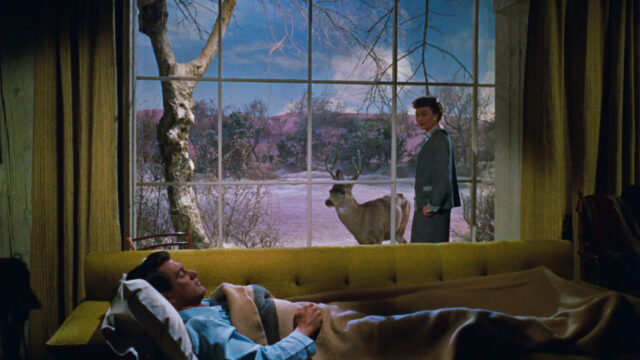
The post Monday Movie: All That Heaven Allows, by Aaron Pinkston appeared first on Battleship Pretension.
Every Monday, we’ll highlight a piece of writing from our vaults. This review of All That Heaven Allows originally ran as part of Aaron Pinkston’s series on the American 50s.
I’m going to make a bold assumption that the average reader of Battleship Pretension hasn’t watched a Douglas Sirk film — even though in my mind that seems impossible. It may be partially that Sirk is seen as a maker of “women’s films.” Or maybe that he’s a filmmaker that hasn’t exactly stood up among the great Hollywood filmmakers though he is the premier auteur of one of Hollywood’s greatest genres. In any case, he’s probably not a filmmaker that would be considered “hip” or be one that immediately comes to mind. Given that he isn’t found in the 100 greatest filmmakers as chosen by the Battleship Pretension readership, this assumption might be true. This boggles my mind. This, of course, could mean that plenty have seen his films but they just don’t like them. This boggles my mind even more. If you haven’t seen a Douglas Sirk film before or haven’t seen one in a long while, treat yourself to one — All That Heaven Allows is a great starting point. The final two films of this series on American films of the 1950’s are both by the melodrama master, wrapping the series up in a very fine manner.
I wouldn’t necessarily disagree with the sentiment that melodramas haven’t quite held up over the years, but when the master of the genre is at his best, it is hard to ignore the power and beauty of these films. Though there certainly are some wonky moments in All That Heaven Allows that may produce some unintentional laughter, the film really isn’t anything like the stereotype that comes with the melodrama. It isn’t at all stodgy, over-performed, over-emotional or manipulative — I can’t quite say the same of last week’s film Some Came Running, which is decent but sometimes peers into the worst aspects of the genre. All That Heaven Allows, like all the best of Sirk, is vibrant, sharp, wonderfully photographed and acted and completely loaded with an energy dangerously close to exploding just beneath the surface. I’ve always seen Sirk much more like Tarantino or his contemporary Sam Fuller and much less like Nicholas Sparks adaptations.
All That Heaven Allows is a simple narrative involving a widow (Jane Wyman) who has a romantic affair with her former gardener (Rock Hudson). Being a type of upper-middle-class socialite in a small town where everyone knows everyone else’s business, it isn’t a relationship easily digested by the scene. There are many excuses given by the random socialites on why this pairing is offensive, all of which are very superficial reasons attempting to control Cary. Some think that she is too old for him, others think that he must only be trying to get at her money. She couldn’t possibly actually be in love with this man, only infatuated with his hunky physique. The very fact that she is in a relationship that obviously involves sex is an affront, as society tells women of Cary’s age that she shouldn’t be looking for romance but companionship and affection (with another suitor literally telling her this in an attempt to propose). There may be many reasons why the townsfolk don’t approve of this relationship but they all feed into the ultimate reason, that it destroys the order of society, a very 1950’s construction.
Ron Kirby, as I mentioned, is a gardener which is obviously a feminized occupation though being a professional anything is coded masculine — I’ve always been interested in the concept that women are “cooks” but men are “chefs.” Being a professional gardener (a business he inherited from his father, another instance of the self-made man’s lie), he doesn’t fit in with the same social circle as Cary, whose husband was a successful businessman and very much cared about his status in society — he seemed to have a lot of friends. Ron doesn’t have a lot of money but that’s just the way he wants it. As Cary begins to spend more time with Ron and meets some of his friends, she begins to understand his “strange” philosophy on life, where having nice things and having nice parties aren’t what’s important, no matter what society tells you. Through the words of Henry David Thoreau’s Walden we are asked, “Why should we be in such haste to succeed?” That was a nice thought for the 1850’s but certainly not for the 1950’s, where success was everything. Kirby’s way-of-life, living out in the woods, amongst nature, literally without society, is the enemy of Cary’s world, provoking Cary’s world to keep them apart.
With this, All That Heaven Allows is absolutely a critique of the 1950’s’ cultural importance of the breadwinner and materialism. By the end of the film, as Cary and Ron spurn society, only then can they be truly happy. Happiness is a major theme of the film, as indicated by the word popping up more than any other throughout my notes. Love is supposed to make us happy but it often presents the complete opposite in both films and real life. In the film, the moments where Cary and Ron should be at their happiest, presumably when they are with each other in society, are the most truly heartbreaking and emotionally violent scenes. Instead, we only see them happy when they are alone, interacting with nature or amongst only others with the same anti-society philosophies. “Acceptable society,” with its great parties and fine things not only is incompatible to Ron and Cary’s personalities but it actively attacks their relationship, making it harder for them to be together.
Sadly, this 1950’s idea of society ties right in to the strong ideas of the 1950’s family and so if their relationship is unacceptable to the greater society, it is also unacceptable to Cary’s family. Where Cary might not truly care what the men and women at the club think about her, when her son and daughter speak against their love, it breaks her. Today, the way people, especially her family, react to her relationship might feel a bit silly but the film presents it as completely urgent. If Cary were to marry Ron, would it really destroy her children’s lives? Well, it would most likely damage the family’s name in the eyes of society, so in this 1950’s world, that might not be so outlandish. Being that social status and family are the two most important concepts in the white-suburban-middle-class 1950’s and with Cary openly threatening the fabric of both, it becomes an extremely pressing situation.
Throughout his lectures accompanying the series’ films, School of the Art Institute professor Fred Camper has said, nearly every week: “Don’t look to the 1950’s for fair representations of women or minorities.” That said, All That Heaven Allows gives us an unconventionally strong woman in a sympathetic and mature status — it’s the first and only film I would truly identify as having a complete and true feminist slant. Cary’s education is that she must care primarily for herself without compromising for anyone in the search for happiness. She learns that everyone around her is selfish, even those who love her and should have her best interests in mind so why shouldn’t she exercise some of that selfishness, too? Her children, her friends and her love interests all dictate to Cary how she should feel or what she should do, asking/telling her to choose them over herself, even if it means that she will be forever unhappy. The idea that a woman should live for herself instead of serving others is simple and logical but profound given the constrictions of the era. With women being objects of the home, raising children and caring for their husbands, Cary stands out as fiercely independent and ultimately fights for herself. Even though the film ends with the promise of marriage, it’s about love, not about servitude or the 1950’s nuclear family.
Throughout the film, there is a running line about how the ancient Egyptians would entomb the surviving widow with her husband, along with his other possessions. When told this, Cary understands that this practice hasn’t gone away and Sirk’s filmmaking heightens the metaphor in the frame. Cary is constantly put into boxes on the screen or seen in mirrors, trapping her in her environments. Living alone in a home once filled with a family has become a tomb. It’s a nice stylistic touch that shows Sirk’s awareness of spaces and how they relate to characters — an important trope in the melodrama.
To close, there is one other excellent bit of 1950’s criticism that we haven’t seen in this series yet, though I have mentioned it before. In my opening post, I talked about how cinema of the 1950’s began defining itself against television — mostly through its technological advances in color, scope and fads like 3D. All That Heaven Allows plays with the cultural significance of the television in tandem with its criticisms of societal views of widows. Television is marketed in the film as a constant companion, really the only one you need. It traps the lonely, brainwashing the masses into a false happiness. In one of the film’s most wonderful imagines, when Cary is presented a television by her son as a Christmas gift, we again see her trapped in a space, in the reflection of the television. This is a path she could have chosen, one that would have been perfectly acceptable by the vision of the 1950’s. Literally being trapped in the clutches of the idiot box signifies the end of Cary’s free life, time to give up her silly pursuits of sexuality and happiness for a safer social standard.
The post Monday Movie: All That Heaven Allows, by Aaron Pinkston first appeared on Battleship Pretension.
The post Monday Movie: All That Heaven Allows, by Aaron Pinkston appeared first on Battleship Pretension.


